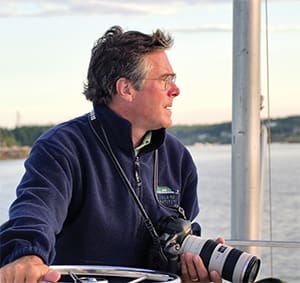In the summer of 2016, photographer Peter Ralston was aboard the 184-foot ketch Rosehearty for a trip to Greenland and into the Northwest Passage. He returned with photos that he now presents at various institutions and which are also on display at his gallery in Rockport, Maine, via Instagram (@PeterinMaine) and on his website (www.ralstongallery.com). Below are some observations on the passage.
Ocean Navigator: How did you get on board for this trip?
Peter Ralston: A friend owns Rosehearty and invited me along both as a friend and photographer. I didn’t think that anything could get me out of Maine in the summer … but this promised to be the trip of a lifetime. Indeed, it was.
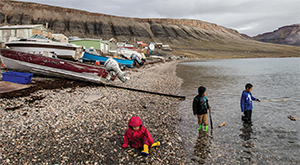 |
|
Local kids playing on the beach at Arctic Bay, Nunavut. |
ON: Did you encounter much ice?
PR: Very little ice. [We did see the] the anticipated glacial icebergs off the west coast of Greenland but extremely little sea ice over on the Canadian side. We only had to move the boat once in anticipation of a wind shift that would have moved light sea ice into us.
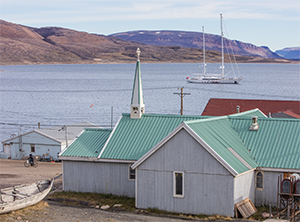 |
|
A church at Arctic Bay, with the ketch Rosehearty at anchor beyond. |
ON: Did the captain make use of a weather routing or ice routing service?
PR: Rosehearty has state-of-the-art electronics of course, but in addition to her own extraordinary crew, we had aboard a truly legendary Ice Master, Captain Patrick Toomey. He’s 82 years of age, first shipped out at age 15, and is still going at it. A strait in Antarctica is named in his honor and he not only kept us out of trouble, but he taught us all a great deal about ice itself.
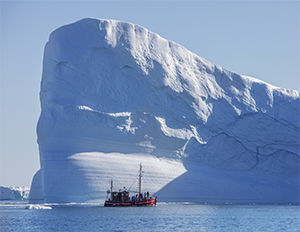 |
|
An iceberg dwarves a fishing boat. |
ON: Did you carry protection from polar bears?
PR: Absolutely. Rule No. 1 was that nobody went ashore — other than into the three Inuit villages we visited — without our guide who carried a 12-gauge with a mix of bear-bangers, rubber slugs and, in case all else failed, magnum lead slugs. In summer, now more than ever, the ice melts way back and without ice there are no seals. No seals means no food for the bears so they can become extremely aggressive this time of year. We never pushed our luck and there were no incidents.
ON: Were there any parts of the passage that provided you with particularly good photos?
PR: Every minute and mile were extraordinary. I would say that it was only during the two-and-a-half-day passage across Baffin Bay when I was not busy shooting.
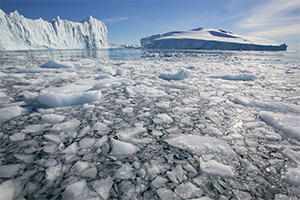 |
|
An iceberg among the loose ice. |
ON: Any interesting wildlife encounters?
PR: Many! A dozen bears, walrus, ringed seals, bearded seals, Arctic fox, musk ox, a lot of interesting birds, narwhals, humpbacks. Plus a sighting (and photo) of a rare Bombus polaris, the Arctic bumblebee at almost 75° N. Arctic char and salmon, the latter being very notable in that they are being seen there for the first time.
ON: Did you primarily sail or power during the trip?
PR: We never set a scrap of sail. We were in serious ice country … so, because of the size and maneuverability of Rosehearty, plus the fact that she has an aluminum hull, we relied on power.
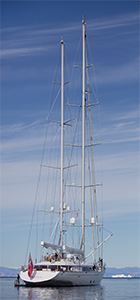 |
|
The ketch Rosehearty. |
ON: Did you see any other yachts?
PR: One other power megayacht in Greenland, which we subsequently sort of avoided on the Canadian side. We saw two smallish eco-cruise ships in the Canadian Arctic.
ON: Would you recommend the Northwest Passage to other voyagers?
PR: I am deeply conflicted by this question. The easiest answer is a simple “Absolutely!!” Having said that, and in a more protective way, there is a complex set of factors to weigh. Things are changing very fast there … climate change is not a “Chinese hoax,” and the evidence about that is abundant and incontrovertible. It’s all going to open up more and more for commercial and tourism purposes, witness our own presence there. Bottom line, it all struck me as still being quite pure yet poised on the brink of vast cultural and environmental changes. I am grateful that I got to see it when I did.
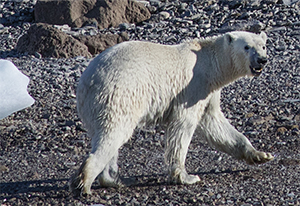 |
|
A polar bear at Croker Bay East. |
ON: What type of communications did you rely on to stay in touch: HF SSB or satellite phone?
PR: There were various systems aboard. We enjoyed being able to access the Internet virtually everywhere we went. The contrast was stark between our mild grumpiness at “slow” connections and the fact that early explorers were lucky if they could get a message to London in less than two years — if ever.

